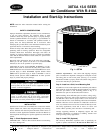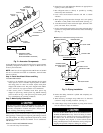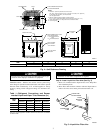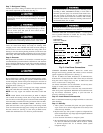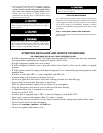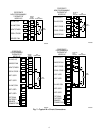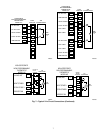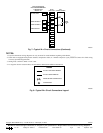
5. Factory charge and superheat charging method are shown on
unit information plate. (See Fig. 4.) R-410A refrigerant
cylinders contain a dip tube which allows liquid refriger-
ant to flow from cylinder in upright position. Charge
R-410A units with cylinder in upright position and a
commercial-type metering device in manifold hose. Charge
refrigerant into suction-line.
Do not disable low-pressure switch during a condenser pump
down. Compressor damage may occur if run at a negative
suction pressure.
Compressor damage may occur if system is overcharged.
Service valve gage ports are not equipped with Schrader
valves. To prevent personal injury, make sure valves are fully
back seated before removing gage port caps. Wear safety
glasses and gloves when handling refrigerant.
Do not vent refrigerant to atmosphere. Recover for system
repair or final unit disposal.
CARE AND MAINTENANCE
For continuing high performance and to minimize possible equip-
ment failure, it is essential that periodic maintenance be performed
on this equipment. Consult servicing contractor or User’s Manual
for the proper frequency of maintenance. Frequency of mainte-
nance may vary depending upon geographic areas, such as coastal
applications.
Step 1—Leave User’s Manual With Homeowner
Explain system operation and maintenance procedures outlined in
User’s Manual.
ATTENTION INSTALLERS AND SERVICE TECHNICIANS!
AIR CONDITIONER WITH R-410A—QUICK REFERENCE GUIDE
•
R-410A refrigerant operates at 50%-70% higher pressures than R-22. Be sure that servicing equipment
and replacement components are designed to operate with R-410A.
• R-410A refrigerant cylinders are rose colored.
• R-410A refrigerant cylinders have a dip tube which allows liquid to flow out of cylinder in upright
position.
• R-410A systems should be charged with liquid refrigerant. Use a commercial type metering device in the
manifold hose.
• R-410A, as with other HFCs, is only compatible with POE oils.
• Vacuum pumps will not remove moisture from oil.
• Do not use liquid-line filter driers with rated working pressures less than 600 psig.
• Do not install a suction-line filter drier in liquid line.
• POE oils absorb moisture rapidly. Do not expose oil to atmosphere.
• Wrap all filter driers and service valves with wet cloth when brazing.
• A liquid-line filter drier is required on every unit.
• Do not use an R-22 TXV.
• If indoor unit is equipped with a TXV, it must be changed to an R-410A TXV.
• Never open system to atmosphere while it is under a vacuum.
• When system must be opened for service, break vacuum with dry nitrogen and replace filter driers.
• Do not vent R-410A into the atmosphere.
• Observe all warnings, cautions, and bold text.
• Do not use capillary tube indoor coils.
5



